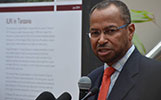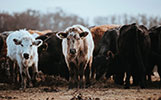| Simplistic Anti–Meat Mantra Hurts Third World 
Andrew Marshall, FarmOnline National | April 17, 2018
The developing world has much to learn from rich western economies, but eating less meat is not one of those lessons.
Kenyan–based livestock research chief, Dr Jimmy Smith, says producing more meat and making it more available to international markets will be critical to helping the economic and nutritional health of developing countries and their small scale farmers.
While some in developed societies keenly promoted meat–reduced or meat–free lifestyles, he said it was unfair to impose such broad–brush views on countries where diets already lacked enough animal–sourced nutrition.
Avoiding Meat And Dairy: A One–Size–Fits–All Measure to Deal With Our Planet's Environmental Problems or a Real Option for The 1.3 Billion People Depending on Livestock to Assure Their Livelihood and Food Security?
VSF International | June 12, 2018
Once again, the debate on sustainable diets and in particular on (not) eating animal–derived products is resurfacing in the media, as illustrated most recently by an article in The Guardian.
The paper reported on a study by J. Poore and T. Nemecek entitled 'Reducing food's environmental impacts through producers and consumers', published in the latest edition of Science magazine. The article concludes that 'avoiding meat and dairy products is the single biggest way to reduce your environmental impact on the planet'.
Both the study and the article recognize the 'large variability in environmental impact from different farms' and the need to deal with the most harmful ones. Still, they seem to overlook the evidence from the 1.3 billion smallholder farmers and livestock keepers for whom livestock is an important source of income and food security (Herrero et al, 2009).
Is Promoting Vegetarianism a Form of Colonialism? 
Zoë Schlanger, Quartz | June 23, 2018
The debate over whether a vegetarian diet is better for the planet is top of mind for many as news of water scarcity, climate change, and deforestation seem to worsen by the day. Sarah Taber, a US–based agricultural scientist who works as a consultant for aquaculture and greenhouse food safety, added another angle to the debate earlier this month.
Taber argues that the assumption that vegetarianism is always more sustainable comes from a Euro–centric perspective, where limited land and surplus water makes it relatively easy to grow food crops and less sensical to dedicate vast tracts of land to graze cows.
In other parts of the world, however, the opposite is true. For example, as Taber calculates it, in the Chihuahua desert of Western Texas and Northern Mexico, "it would takes a thousand times more water to grow an acre of crops for human consumption, than it takes to grow an acre of cow on wild range."
The Vegan Craze: What Does It Mean For Pastoralists?
Ian Scoones, Steps Centre | June 22, 2018
There's a vegan craze in full swing in Brighton in the UK – and it seems more broadly. There was a vegan festival near my house the other weekend, and vegan graffiti (in washable chalk, I hasten to add) appears frequently in our local park. My daughter became a vegan for a period a year or so ago after a school trip to a local farm.
I have nothing against veganism, and I see its potential health, welfare and environmental benefits, certainly for consumers in northern Europe. But what would a mass shift from livestock products mean for poor pastoralists living in marginal areas?
In the Guardian, George Monbiot announced rather dramatically that 'farming livestock for food threatens all life on earth', while the Independent argued that not consuming meat and dairy could 'reduce your carbon footprint by nearly three–quarters'. Damian Carrington, the Guardian's environment editor, quoted the authors as saying that avoiding meat and dairy is the 'single biggest' way to reduce the impact on the earth. Newsweek was more direct, with the headline: 'Want to save the planet? Go vegan, says study.'
In Pursuit of Low–Emissions Cows–ILRI's Jimmy Smith and John Goopy on Transforming 'Idling' Cows To Climate–Smart Animals 'Zooming Down the Highway' 
Susan Macmillan, ILRI Clippings | October 18, 2018
Researchers are on the hunt for a cow that produces less methane, one of the major contributors to climate change. If and when those green genes can be easily isolated, they could be spread throughout global cattle populations.
'The livestock sector accounts for an estimated 14.5 percent of human–related greenhouse gas emissions globally, with about 44 percent of those emissions in the form of methane, according to the U.N.'s Food and Agriculture Organization. Methane is a byproduct of livestock digestion and manure emissions, among other sources. Cattle account for the majority of the sector's contributions, adding to about 65 percent of emissions.
'While methane has a shorter lifetime in the atmosphere than carbon dioxide, it is more effective at trapping radiation. This makes its impact over a 100–year period more than 25 times greater than carbon dioxide, according to the U.S. Environmental Protection Agency.
A Key Component to Ending Poverty and Hunger In Developing Countries? Livestock
Steve Staal, Los Angeles Times | July 13, 2018v
The recent emergence of famine in Nigeria, Somalia, South Sudan and Yemen that has left more than 20 million people on the brink of starvation is a reminder of the difficulty of ending hunger around the world.
The problem is complex, and, unfortunately, policymakers have largely ignored an economic sector that could be a key part of the solution: small–scale livestock farming. But that may be starting to change. At a high–level United Nations meeting currently underway, several events on poverty and hunger will feature the importance of livestock.
The key message of these sessions is that livestock's potential for bolstering development lies in the sheer number of rural people who already depend on the sector for their livelihoods. These subsistence farmers also supply the bulk of livestock products in low–income countries.
Livestock Belongs on the Table–If We Eat Meat or Not
Berhe Tekola, Bangkok Post | June 25, 2018
In a world where competition for resources is increasingly fierce, sustainability is often seen in terms of reducing over–consumption. This is especially true when it comes to animal production, with some calling for a worldwide switch to entirely plant–based diets to reduce pressure on the environment.
But the truth is sustainability is not so straightforward. Those offering such a simple solution for global food security miss at least two important points. First, we do not compete with livestock for resources as much as we think. | |
